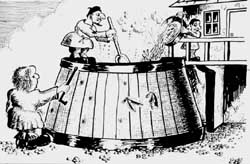The Lavoisier Medal
Starting with its VIIth conference the ISBC has presented the Lavoisier Medal to an internationally acknowledged scientist for an outstanding contribution to the development and/or the application of direct calorimetry in biology and medicine (see details in Thermochimica Acta 219, ix).
The obverse of The Lavoisier Medal displays the portrait bust of Antoine-Laurent Lavoisier (1743-1794) with the legends THE LAVOISIER MEDAL FOR CALORIMETRY and PRESENTED TO while on reverse is the famous Lavoisier ice calorimeter together with the legends ISBC and "THE FIRE OF LIFE" - the title of Max Kleiber's famous book (London, New York 1961) on biological calorimetry and animal energetics.
Winners
of the Lavoisier Medal
1990:
Ingemar Wadsö / Lund, Sweden
1992: Richard B. Kemp / Aberystwyth, UK
1994: Lee Hansen / Provo, USA
1997: Ingolf Lamprecht / Berlin, Germany
1999: Anthony E. Beezer / London, UK
2001: Lena Gustafsson / Göteborg, Sweden
2003: Erich Gnaiger / Innsbruck, Austria
2006: Mario Monti / Lund, Sweden
Dubrunfaut
Award
In 1996 the Committee decided the Society ought to recognise at appropriate times the contribution to calorimetric studies of non-calorimetrists whose work has had an important influence on developing the field. After much consideration it was decided to adopt the name of Dubrunfaut whose gigantic calorimetric experiment was probably the first measurement of microbial heat production (see Thermochimica Acta 309 (1998) ix)
1997: Edwin Battley / Stony Brook, USA
1999: Urs von Stockar / Lausanne, Switzerland
Richard Kemp directing the addition of molasses in the largest ever calorimetric experiment by Dubrunfaut – the vessel was 22000 litres and contained fermenting yeast (see above).






